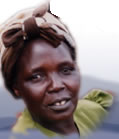 |
 |
||
 |
|||
|
RELATED THEMES agriculture education history identity land OTHER LOCAL THEMES BACKGROUND |
livestock
Owning cattle has always been important for the Sabaot as they were originally pastoralists. One narrator points out: "...originally, us the Sabaot had a lot of contempt for the people who cultivated crops. We were pastoralists, and virtually everything we used was obtained from the livestock. But right now the people have responded positively to the changes in the society, and crop production is taking root in the community. However, the Sabaot still hold livestock keeping in high esteem and you can hardly find a household that has no livestock" (Kenya 14) . In the past - and to a certain extent this is still true - cows equalled wealth and were, for example, used for bride-price. The more cattle somebody had, the higher their social prestige. Livestock was central to Sabaot identity, and was one of the ways they differentiated themselves from other communities such as the agriculturalist Bukusu. Parting with cattle was therefore something that a Sabaot would do only reluctantly. Several narrators describe their parents' initial resistance to sending them to school, not only because they would be losing a valuable herdsboy/girl, but also because it meant selling stock to meet the school fees. The change in attitude to education can be seen in the fact that "...right now Sabaot parents can even sell their livestock to pay fees for their children. This was previously the last thing that the Sabaot would do" (Kenya 12) . This reassessment also reflects the fact that the decline in pastoralism has made education more economically attractive: "Right now the population has increased and there is no space for keeping large herds. This has made it imperative for many people to go to school so that they are able to gain employment" (Kenya 11) . Donkeys remain a key form of transport in Mount Elgon. quotes about livestock"...in the past....the main source of conflict was cattle rustling....It was always very honourable to bring home livestock from a raid, because this emphasised the fact that you were a brave and courageous man." ".[To] a Sabaot, if you challenge him on land and cow, you are an enemy straight away. " "We grow a lot of food crops these days...We also keep exotic breeds of dairy cattle...We are also able to take proper care of our family from the proceeds we get from selling the milk." "...when we look at our livestock today, the low yielding indigenous breeds are being slowly replaced, but not with grade cattle, which are expensive to maintain, but with crossbreeds." |
|